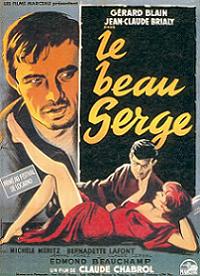Le Beau Serge
| Le Beau Serge | |
|---|---|
 Film poster | |
| Directed by | Claude Chabrol |
| Written by | Claude Chabrol |
| Produced by | Claude Chabrol |
| Starring | Jean-Claude Brialy Gérard Blain |
| Cinematography | Henri Decaë |
| Edited by | Jacques Gaillard |
| Music by | Émile Delpierre |
Release date |
|
Running time | 99 minutes |
| Country | France |
| Language | French |
| Budget | FFR 37,000,000 |
Le Beau Serge (French pronunciation: [lə bo sɛʁʒ], meaning "Handsome Serge") is a French film directed by Claude Chabrol, released in 1958. It has been cited as the first product of the Nouvelle Vague, or French New Wave, film movement. The film is often compared with Chabrol's subsequent film Les Cousins, which also features Jean-Claude Brialy and Gérard Blain.
Plot[]
François, a successful yet sickly young man, returns to his home town Sardent after a long absence. He finds that his friend Serge has become a wretched alcoholic, dissatisfied with his life in the village. Serge had hoped to leave the village to study, but had to stay to marry Yvonne when she became pregnant. The death of their stillborn child did not help. Serge has become an angry, bitter figure not unlike the roles of James Dean, refusing to face reality and adulthood.
Yvonne is again pregnant. François finds himself at odds with provincial village life yet compelled to help Serge. The fact that they are both entangled sexually with Yvonne's sister, Marie, makes things more complicated. Finally, the birth of Serge and Yvonne's second child seems to provide some possibility of happiness.
Cast[]
- Gérard Blain as Serge
- Jean-Claude Brialy as François Bayon
- Michèle Méritz as Yvonne
- Bernadette Lafont as Marie
- Claude Cerval as The priest
- Jeanne Pérez as Madame Chaunier
- Edmond Beauchamp as Glomaud
- André Dino as the doctor
- Michel Creuze as Michel, The baker
- Claude Chabrol as La Truffe
- Philippe de Broca as Jacques Rivette de la Chasuble
Production[]
Chabrol had originally intended to shoot Les Cousins first, but due to its Paris setting, it would have been twice as expensive to film. He chose instead to shoot in Sardent, a village where his mother lived before moving to Paris and where he often spent the summer with his grandmother. The film was shot over nine weeks in the winter of 1957-8 on a budget of 32 million old francs.[1] It was financed from his first wife's inheritance. The film initially ran to 2 hours and 35 minutes, though Chabrol cut a great deal of quasi-documentary material to reduce the running time, a decision he later regretted.[2]
References[]
External links[]
- Le Beau Serge at IMDb
- Le beau Serge: Homecomings an essay by Terrence Rafferty at the Criterion Collection
- 1958 films
- French-language films
- French films
- Films directed by Claude Chabrol
- Films about alcoholism
- 1958 directorial debut films